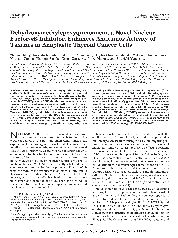摘要
Nuclear factor kappa B (NF-kappa B), as an antiapoptotic factor, crucially affects the outcomes of cancer treatments, being one of the major culprits of resistance to chemotherapy. In this study, we investigated whether dehydroxymethylepoxyquinomicin (DHMEQ), a novel NF-kappa B inhibitor, can enhance antitumor activities of taxanes in anaplastic thyroid cancer (ATC) cells. Taxanes induced NF-kappa B activation in ATC cells, which could compromise the therapeutic effect of the drugs. However, DHMEQ, by inhibiting the nuclear translocation of NF-kappa B, completely suppressed the DNA binding capacities of NF-kappa B and lowered the levels of nuclear NF-kappa B protein. Compared with single treatment (either taxane or DHMEQ), the combined treatment strongly potentiated apoptosis, confirmed by cell survival assay; Western blotting for poly ( ADPribose) polymerase, caspase 3, X-linked inhibitor of apoptosis, and survivin; and flow cytometry for annexin V. Furthermore, we also demonstrate for the first time that the combined treatment showed significantly greater inhibitory effect on tumor growth in a nude mice xenograft model. These findings suggest that taxanes are able to induce NF-kappa B activation in ATC cells, which could attenuate antitumor activities of the drugs, but inhibition of NF-kappa B by DHMEQ creates a chemosensitive environment and greatly enhances apoptosis in taxanes-treated ATC cells in vitro and in vivo. Thus, DHMEQ may emerge as an attractive therapeutic strategy to enhance the response to taxanes in ATCs. (Endocrinology 149: 5357-5365, 2008)
- 出版日期2008-11
- 单位天津医科大学
